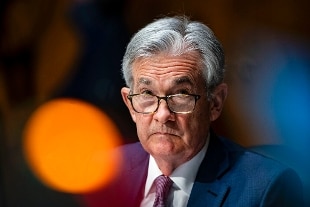Jerome Powell, president of the Fed (Ap)
Share
March 17, 2021 The Federal Reserve has left interest rates unchanged but has revised its estimates on growth and inflation in the United States sharply upwards.
In particular, the FOMC, the executive board of the US central institute, estimates that the stars and stripes GDP will grow by 6.5% this year, against the + 4.5% expected in December.
Unemployment will stand at 5% against 4.5% in the previous projection.
Inflation will rise to 2.4% this year before cooling down again in 2022.
However, monetary policy remains unchanged.
The cost of money is kept between 0 and 0.25%.
And, in any case, the improvement in the economic outlook does not change expectations on rates which will remain steady at least until 2023.
Although with a different composition of opinions: seven out of 18 FOMC members now expect an increase in 2023, compared to 5 in December, and 4 think that the tweak could come as early as next year, against 0 at the end of last year.
The $ 120 billion-a-month stock purchase program is also untouched.
The Federal Reserve, reads the note released at the end of the FOMC meeting, "is committed to using all tools to support the US economy in these challenging times, so as to help achieve its full employment and price stability goals. . The Covid-19 pandemic ", the statement continues," is causing tremendous economic and human losses throughout the United States and throughout the world. After a slowdown in the pace of recovery, the indicators of economic activity and employment have returned recently accelerated, although sectors hardest hit by the pandemic remain weak. Inflation continues to stay below 2%. Overall financial conditions remain accommodative, partly reflecting policy measures put in place to support the economy and flow. credit towards citizens and businesses ".
In any case, the Fed warns, "the path of the economy will depend significantly on the course of the virus, including progress in vaccinations. The current health crisis continues to weigh on economic activity, employment and inflation and poses considerable risks to the economic outlook ".
The Fed continues to "try to achieve maximum employment and inflation of 2% over the long run. With inflation persistently below this long-term target, the FOMC intends to achieve inflation moderately above 2% for some time in so that inflation averages 2% over time and long-term inflation expectations remain firmly anchored at 2% ".
The Fomc therefore reiterates its will to "maintain an accommodative monetary policy until these results are achieved" and "expects that it will be appropriate to maintain" the reference rates between 0 and 0.25% "until market conditions jobs have not reached levels consistent with the assessment of maximum employment and inflation has not reached 2% and is on the way to moderately exceed 2% for some time ".
The FOMC, the note concludes, "remains ready to adjust its monetary policy as appropriate if risks arise that could jeopardize the achievement of its objectives".
Powell: uneven recovery, we will support the economy
"The state of the economy in the coming years is very uncertain" and for this reason "the time has not yet" come to start thinking about a withdrawal of extraordinary monetary policy interventions and a rise in interest rates.
This was stated in a press conference by Federal Reserve Chairman Jerome Powell, pointing out that even if "the worst-case scenario" has been avoided, "no one should be pleased" with the current situation.
Powell explained that "the Fed will provide support to the economy for as long as necessary".
The recovery remains uneven, and is far from complete, adds Powell, stating that the unemployment rate remains high.
Inflation will rise in the coming months but these one-off hikes will only have a transitory effect, Powell says, noting that transient increases in inflation do not translate into a rate hike.
"The American economic recovery is driving the world one. American demand will support global activity," said the Fed chairman, answering those who asked him if he was concerned about the impact of the divergence in terms of growth between the United States and Europe.
"I'd like Europe to do better on growth and vaccinations, but for now I'm not worried about us," says Powell.

